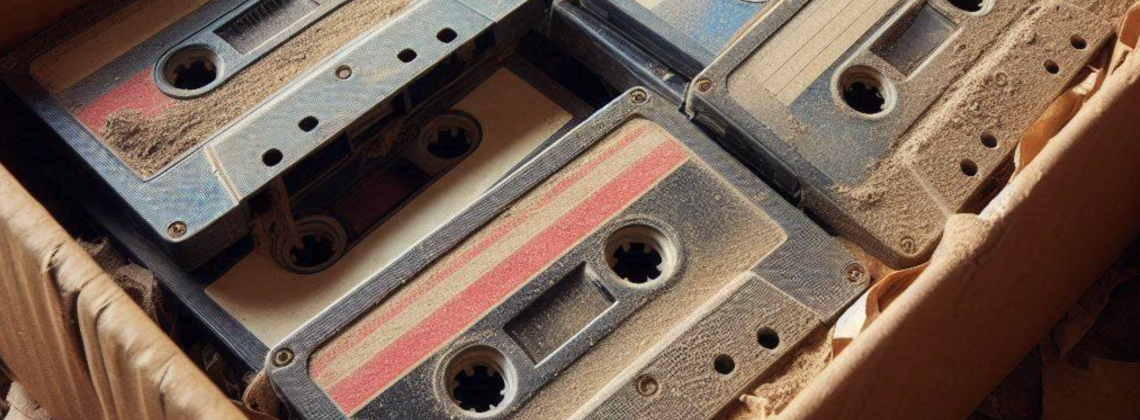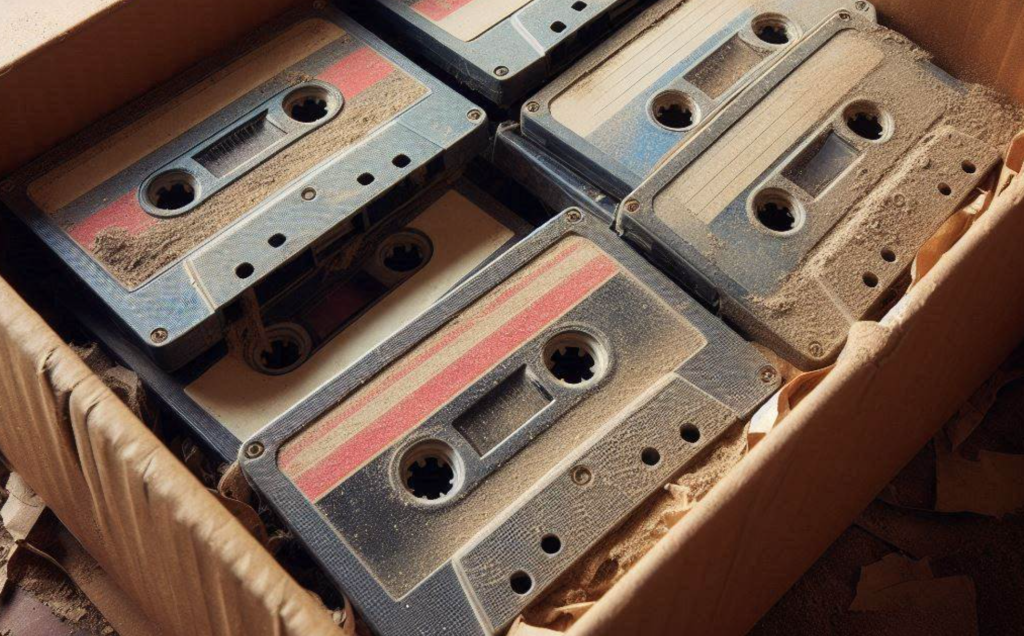

A cardboard box of cassettes carries a whole lot more
When I describe my hometown—Wait, two hundred people in the whole town?—and the experience of living in a place where everyone knew everyone else, just as their families had for generations, I suppose it sounds stifling, but when I was a kid, this was all I knew. Here I am decades later, in a city of half a million, living on a street full of strangers, but furrowed into my memory are experiences in that community and a way of life that seems long gone.
Recalling all the ways that place affects my identity, I think of how I half-expect clothes on the line behind people’s houses, and my dressing a certain way (a family trait as it turns out; here I recall my mother’s remark when my father asked how he looked before a Christmas party: “Just like a Barham, like you don’t give a damn how you look”). There’s the rain gauge I keep, and my inclination to greet strangers on the street—all holdovers from a small farming town. But maybe the truest holdover of all is my voice: form and content, accent and expressions.
My wife says she can tell when I’m talking to people from home because my speech changes. Not long ago my dad called to say that a family member had seen a video from the college where I work. I was excited that a beloved relation, someone I have respected since I was a kid, saw me doing my day job. But what he said was: “Robert Erle has lost his accent.” It sounded like a mild rebuke. He doesn’t sound like he’s from home anymore.
Recently my father gave me a box of cassettes his family recorded and sent him during the Vietnam War when he was stationed in the Mekong Delta, a place of rivers, swamps, and farmland. A place where he would pray at a USO Christmas show, “Dear God, please let me make it home.” There were twelve tapes, twelve hours of family, friends, and neighbors, that had lain in a beat-up cardboard box in my parent’s home. I thought, now over fifty years since they were recorded, that surely they would be ruined. I was wrong.
When I pressed play, suddenly all those people—my father’s family, friends, and neighbors—were in the room, conjured across the decades. They spoke and I exclaimed—half laughed—at the sounds of aunts and uncles, young and full of banter, grade-school age cousins, shy and soft-spoken, people in town about whom I had only heard stories, and my grandmother who sounds like a girl. One recording has a cooing baby, my dad’s nephew, whose parents named him after my dad—maybe thinking he wouldn’t return and so needed a namesake. I was struck by everyone’s drawls, their humor and teasing way of talking. I had never met many of them, had only heard stories, but when they spoke I was spellbound, arrested by voices at once strange and recognizable.
More than anything, these tapes were an invitation into mystery, prompting a host of questions: Who is on these tapes? What do they talk about? What was my dad like? Why did he save these tapes?
What if you suddenly had a window into a loved one’s life, into their experiences from decades earlier? One of my favorite novels features a protagonist facing down middle age who suddenly finds a way to relive her sixteenth birthday. It’s a novel about contingencies, possibilities, and more than anything, love. As it turns out, her chief delight is getting to spend time with her dad, young and healthy in the past, but infirm in the present. That is what these tapes were like—they were a time machine for understanding a man I have spent a lifetime admiring, longing to know more and better. Every night after my family went to bed I was transported back in time, to a year from the fall of 1971 to the spring of 1972. Even my dreams were affected.
It was a common practice for loved ones to send recordings to soldiers in Vietnam—a friend remembers sending reel-to-reel recordings to his uncle. But what’s unusual is the place these tapes rendered. My hometown was a rural farming community, culturally distinct and isolated. The recordings give a glimpse of what daily life was like. My father’s fellow soldiers asked him to play and replay portions of the tapes, which suggests they were remarkable even then. Now I look up—five decades after they were recorded—to find that the place they capture doesn’t quite exist anymore, even as it continues to shape my understanding of the present.
In mystery stories, the kind I read and teach, detectives trace revelations backward—from the telos of the present to earlier possibilities, before consequence had its say. The tapes had the sounds of earlier, emerging selves of the people and place I love.
I knew that hearing all those voices, listening to the tapes from start to finish, would change my sense of home, family, and above all my dad. And it did. Excavating the past is not safe—or without risk, let’s say. Listening to those voices led to discoveries I wouldn’t otherwise have made. Growing up, I remember Vietnam field jackets in the closet, field rations in the pantry, and photos on my dad’s desk showing him in fatigues. I remember wearing dad’s military issue P-38 can opener on a chain around my neck too. I wanted to be like him as long as I can remember. But never had I heard the stories prompted by the tapes and all those voices.
What began in mystery entailed family revelations—and then an exploration of personal and communal tragedies, and a meditation on the nature of voice in literature and life.
Writer Anne Karpf calls voice a “most glorious instrument,” celebrating its capacity to reveal biology, psychology, class, age, illness, sociability, health, and disposition. She notes that even though we are immersed in the voices of those around us, we are nevertheless ignorant of their effects—“most of the time without any inkling of how they work on us or shape our comprehension.”
The Vietnam tapes confirm Karpf’s remarks. They disclose just how much my father was formed by this place and how language, dispositions, and behaviors carry across time. My father—with his boyish smile and ferocious independence, who says, If you need me, you call me and I’ll bring the cavalry, and In every life, a little rain must fall, and If you hear I’m in a fight with a bear, pray for the bear—has a preternatural charm that was cultivated by these people. Their levity feels like atmosphere, a spirit pervading their words. Their playful, teasing manner too. There is no doubt my father was loved, and loved in a way that encouraged his thriving.
Listening to those cassette tapes, I had a window into a way of life, with its wonders—some dark and tragic features too. Ultimately what I discovered was a way of being in the world, one that persists into the present: The tapes offered a chorus of voices with notes I still sing.
Growing up in a particular community means that its perspectives can become intuitive, common sense, what one regards as true, self-evident. I had heard the voices from this place all my life. But not until the Vietnam tapes did I really listen. As I study literature, teach students, marvel at my children, and write about the world around me, my life reverberates the perspectives of this community.
The endurance of things in memory is something I often find myself meditating on these days. While the Vietnam tapes conjured a whole world, one that still existed when I was a child but that has gone away, hearing those tapes made me realize that a way of life can continue—despite seeming evanescence. I carry it with me in memory, in habits, in my disposition toward the world, and in my speech.
My undertaking with those tapes was not about abstract analysis; it was about hanging on for dear life to the things that are good. What I found myself returning to with all those recorded voices was their joy, their love for one another, their life together. But what remains, the strongest consequence of hearing those recordings, is gratitude for the gift of understanding my father better, my home and family too.
Shame on me if I don’t acknowledge readers for whom voices from the past can be persecutory, full of pain and sorrow, readers who would rather not revisit the past at all. I grieve at the thought, and none of what I’ve said here matters if I don’t acknowledge such. Still, there can be “gladness in the ruthless / furnace of this world,” to quote the poet Jack Gilbert. The Vietnam tapes reveal the sustaining joy that can come from the voices of loved ones, the ones most worth remembering.
Robert Erle Barham is Associate Professor of English at Covenant College in Lookout Mountain, GA. He is the deputy editor of Current.